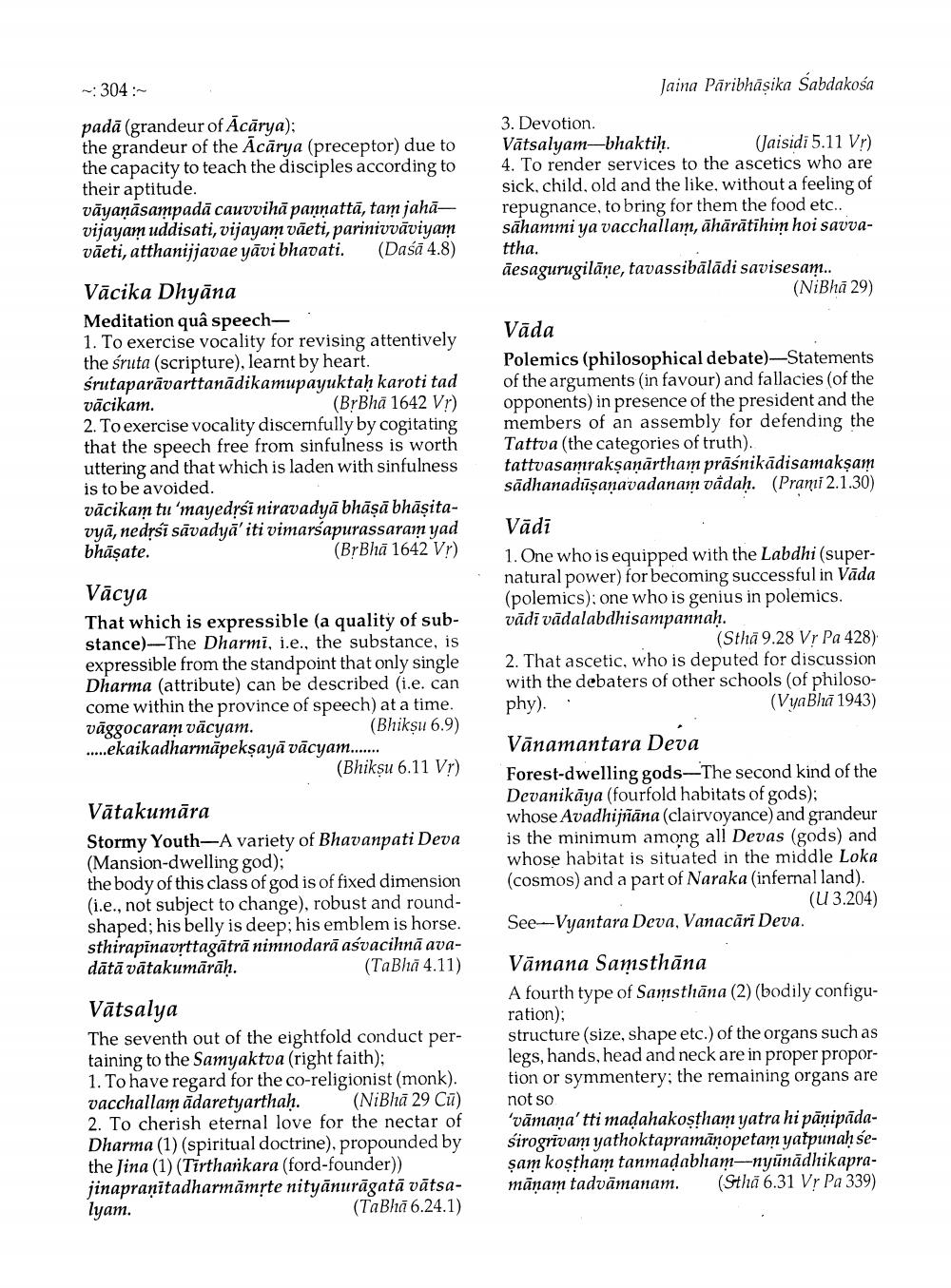________________
Jaina Pāribhāṣika Šabdakosa
304 - padā (grandeur of Ācārya); the grandeur of the Acārya (preceptor) due to the capacity to teach the disciples according to their aptitude. vāyaṇāsampadā cauvvihā pannattā, tam jahāvijayam uddisati, vijayam vāeti, parinivvāviyam vārti, atthanijjavae yāvi bhavati. (Dasa 4.8)
3. Devotion. Vätsalyam-bhaktih.
(Jaisidi 5.11 Vr) 4. To render services to the ascetics who are sick, child, old and the like, without a feeling of repugnance, to bring for them the food etc.. sāhammi ya vacchallam, āhārātihim hoi savvattha. āesagurugilāne, tavassibālādi savisesam..
(NiBhā 29)
Vācika Dhyāna Meditation quâ speech1. To exercise vocality for revising attentively the śruta (scripture), learnt by heart. śrutaparāvarttanādikamupayuktaḥ karoti tad vācikam.
(BrBhā 1642 Vr) 2. To exercise vocality discernfully by cogitating that the speech free from sinfulness is worth uttering and that which is laden with sinfulness is to be avoided. vācikam tu 'mayeděsi niravadyā bhāṣā bhāṣitavyā, nedrsi sāvadyā' iti vimarsapurassaram yad bhāșate.
(Br Bhā 1642 Vr)
Vāda Polemics (philosophical debate)-Statements of the arguments in favour) and fallacies (of the opponents) in presence of the president and the members of an assembly for defending the Tattva (the categories of truth). tattvasamraksanārtham prāśnikādisamaksam sādhanadūṣaṇavadanam vådah. (Prami 2.1.30)
Vācya That which is expressible (a quality of substance)-The Dharmi, i.e., the substance, is expressible from the standpoint that only single Dharma (attribute) can be described (i.e. can come within the province of speech) at a time. vāggocaram vācyam.
(Bhikṣu 6.9) .....ekaikadharmäpekṣayā vācyam.....
(Bhiksu 6.11 Vr)
Vādi 1. One who is equipped with the Labdhi (supernatural power) for becoming successful in Vāda (polemics): one who is genius in polemics. vādi vādalabdhisampannaḥ.
(Sthā 9.28 Vr Pa 428) 2. That ascetic, who is deputed for discussion with the debaters of other schools (of philosophy).
(Vya Bhā 1943)
Vātakumāra Stormy Youth-A variety of Bhavanpati Deva (Mansion-dwelling god); the body of this class of god is of fixed dimension (i.e., not subject to change), robust and roundshaped; his belly is deep; his emblem is horse. sthirapinavrttagātrā nimnodarā aśvacihnă avadātā vātakumārāḥ.
(Tabha 4.11)
Vānamantara Deva Forest-dwelling gods—The second kind of the Devanikāya (fourfold habitats of gods); whose Avadhijñāna (clairvoyance) and grandeur is the minimum among all Devas (gods) and whose habitat is situated in the middle Loka (cosmos) and a part of Naraka (infernal land).
(U 3.204) See--Vyantara Deva, Vanacārī Deva.
Vātsalya The seventh out of the eightfold conduct pertaining to the Samyaktva (right faith); 1. To have regard for the co-religionist (monk). vacchallam ādaretyarthaḥ. (NiBhā 29 Cū) 2. To cherish eternal love for the nectar of Dharma (1) (spiritual doctrine), propounded by the Jina (1) (Tirtharkara (ford-founder)) jinaprañitadharmām;te nityānurāgatā vātsalyam.
(TaBhā 6.24.1)
Vāmana Samsthāna A fourth type of Samsthāna (2) (bodily configuration); structure (size, shape etc.) of the organs such as legs, hands, head and neck are in proper proportion or symmentery; the remaining organs are not so 'vämana' tti madahakostham yatra hi pāṇipādasirogrīvam yathoktapramānopetam yatpunaḥseşam koştham tanmadabham-nyünādhikapramāņam tadvāmanam. (Sthā 6.31 V? Pa 339)




